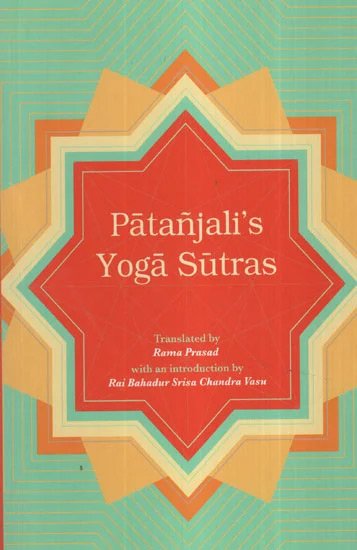Yoga-sutras (with Vyasa and Vachaspati Mishra)
by Rama Prasada | 1924 | 154,800 words | ISBN-10: 9381406863 | ISBN-13: 9789381406861
The Yoga-Sutra 1.10, English translation with Commentaries. The Yoga Sutras are an ancient collection of Sanskrit texts dating from 500 BCE dealing with Yoga and Meditation in four books. It deals with topics such as Samadhi (meditative absorption), Sadhana (Yoga practice), Vibhuti (powers or Siddhis), Kaivaly (isolation) and Moksha (liberation).
Sūtra 1.10
Sanskrit text, Unicode transliteration and English translation of Sūtra 1.10:
अभावप्रत्ययालम्बना वृत्तिर् निद्रा ॥ १.१० ॥
abhāvapratyayālambanā vṛttir nidrā || 1.10 ||
abhāva—of non-existence, of voidness, pratyaya—the cause, the feeling. ālambanā—substratum. i.e., having for its substratum, or support. vrittiḥ—modification. nidrā—deep sleep.
10. Sleep is the mental modification which has for its objective substratum, the cause of non-existence.
The Sankhya-pravachana commentary of Vyasa
[English translation of the 7th century commentary by Vyāsa called the Sāṅkhya-pravacana, Vyāsabhāṣya or Yogabhāṣya]
[Sanskrit text for commentary available]
“Sleep is the mental modification which has for its objective substratum the cause of non-existence.” And this is a particular kind of notion, because it is called back on awakening. How? ‘I have slept well. My mind is clear; it renders my intellect bright,’ ‘I have slept badly; my mind is listless; it wanders and is unsteady.’ ‘I have slept with great stupidity; my limbs are heavy; my mind is. tired; it stands as it were lazy and absent.’ This calling back would certainly not exist on awakening, if there were no recognition of the cause: and there would not be memories dependent thereupon and having that for their object. Therefore sleep is a particular kind of notion, and further it is to be checked in trance like any other modification.—10.
The Gloss of Vachaspati Mishra
[English translation of the 9th century Tattvavaiśāradī by Vācaspatimiśra]
The word ‘vṛtti’ is the subject of discussion and is, therefore, understood by context. As there is no difference of opinion among rival thinkers as to Real Cognition, Unreal Cognition, Imagination and Memory being mental modifications, the word is not used in those places separately for emphasizing the distinction. In the case of sleep, however, there is difference of opinion. It has, therefore, to be specially stated that it is a modification of the mind. The understanding by context would not serve to emphasize the teaching. Therefore the word modification is repeated a second time.
The non-existence spoken of is of the modifications of the waking and dreaming states. The cause (pratyaya) thereof is the darkness (the quality of inertia) which covers the light of the intellect (the buddhi, the will-to-know). The mental modification, of which this becomes the substratum (that is the object), is spoken of as sleep. The substance of the will-to-be being possessed of the three qualities, whenever inertia appears and overpowers the qualities of essence and disturbing Energy and thus throws a veil over all the means of knowledge, then the will-to-know does not put on the shape of the object of knowledge, and the puruṣa, being conscious for the time of the overpowering darkness of inertia alone, is said to be sleeping well with consciousness turned inwards.
Why then this non-existence of the modifications should not be the modification of sleep? Why should it not be similar to the states of restraint and perfect freedom (kaivalya)? For this reason, says
“And that is a particular notion, because it is called back on awakening.”
‘Calling back’ is the remembrance thereof with all its adjuncts. How? When the Tamas appears along with the Sattva, the reflection of one who has awakened after sleep, is like this:—‘I have slept well; my mind is clear and makes my intellect bright.’ Bright means pure.
When the Tamas appears along with the Rajas, the reflection is similar to what is expressed by—
‘I have slept painfully; my mind is unfit for work.’ Why? Because it wanders, it is unsteady.
Then speaks of the reflection of one who awakes after a sleep, in which the Tamas appears, having to its utmost overpowered the Sattva and the Rajas
‘I have slept very stupidly; my limbs are heavy; my mind’ is tired, lazy and as it were absent.’
The fact to be proved having been established by the canon of difference, now applies the same canon of difference to the cause thereof.
‘Dependent thereupon means caused by the recognition.’
‘Having that for their object,’ means ‘having the cause of the non-existence of the modifications for their object.’
The cause is recognized in this way, ‘This is it.’
And it is recognized by him who awakens, i.e., just on awakening. The meaning is that at the time of awakening, the knowledge of the notion exists along with the knowledge of the cause of the non-existence of the modifications.
The question arises: The modifications of Real Cognition, &c., show themselves in an outwardly inclined mind; they are, therefore, to be checked, being contrary to trance. Sleep, however, is similar to the modification of one-pointedness; why then should it be contrary to trance?
For this reason, says:—
‘And further it is to be checked in trance like any other modification.’ The meaning is that although it is similar to the modification of one-pointedness, yet it is caused by Tamas, and is, therefore, contrary to both the Cognitive and the ultra-cognitive trances.
The meaning is that that too is to be checked.
